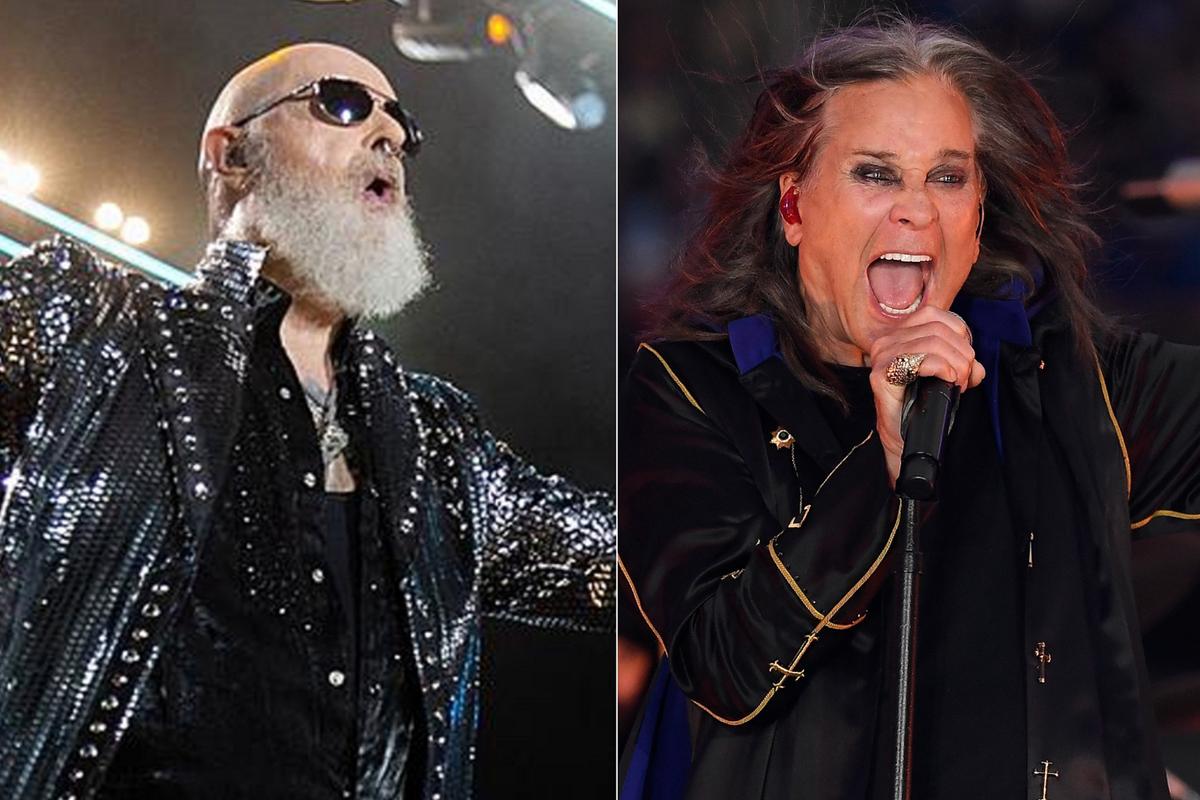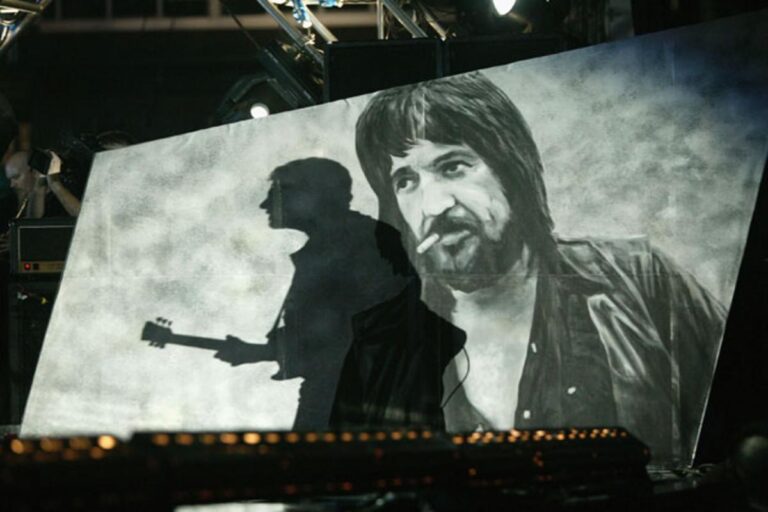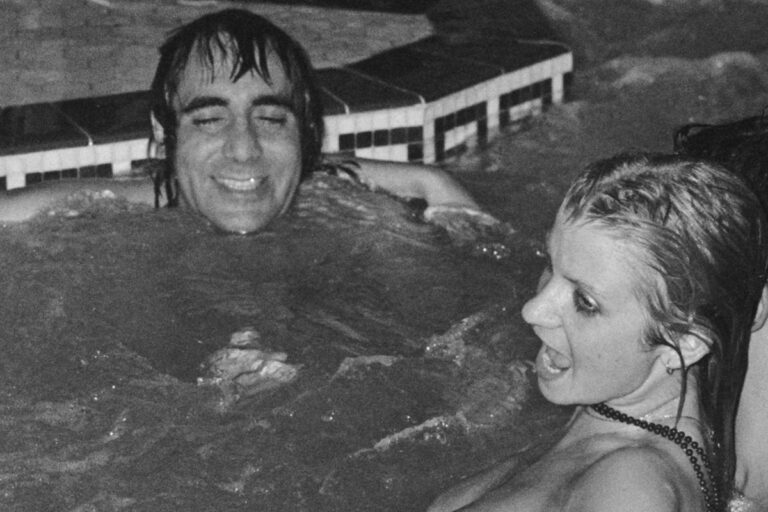It’s no small task to step in front of a microphone with Black Sabbath. Judas Priest vocalist Rob Halford found that out when he had the challenge of delivering the goods.
The first time came during the revived Ronnie James Dio era of the band in the early ’90s when Black Sabbath agreed to open two special California dates on Ozzy Osbourne’s No More Toiurs farewell run. When Dio refused to front Sabbath for the gigs, Halford stepped in. He’d get the call one more time under different circumstances — and this time, it was the Camden, New Jersey stop of 2004’s OzzFest. The Metal God bravely took the microphone once again, with only hours of notice, to substitute for the Prince of Darkness, who had come down with bronchitis.
During a recent conversation with UCR that you can listen to below, Halford looked back on those moments, while also dishing on the plans for Judas Priest’s fall tour with Alice Cooper and Corrosion of Conformity. The 35th anniversary of Painkiller is one part of the playbook and an album that the singer still marvels over. [It’s] become a much blessed and revered album,” he shares. “Not only for Priest, but for metal in general.”
Heavy metal’s self-described Perry Como (admittedly, quite a deep cut reference) had plenty to discuss, so let’s begin…
Rob’s Experiences With Ozzy Osbourne and Black Sabbath
We’ve been mourning the recent loss of Ozzy Osbourne. You had the chance to step in and play with Black Sabbath a few times. How did you prepare for those gigs?
[For the gigs filling in for] Ronnie, we were able to prepare because Tony [Iommi], Geezer [Butler] and Bill [Ward], they were on tour and they came through Phoenix. We actually jammed somewhere here in the valley. [So] we prepared for that one. I found out the other day that Ozzy was on the side banging his head while we were working. I did not know about that, but a close friend of mine said, “Yeah, I was standing by Ozzy while he was giving everybody the thumbs up. The other time [at OzzFest 2004] in New Jersey was really spontaneous. I’m in my hotel room in Philadelphia, and Sharon [Osbourne] calls me up, and she goes, “Robbie, can you help us out? Ozzy’s lost his voice.” I said, “Yeah, what do you want me to do?” “Can you sing for him?” I said, “Yeah, anytime.” She goes, “Tonight.” I said, “Tonight?“
We were together, Priest and Sabbath, on that tour. So I’m like, “Oh my God!” She goes, “Oh, you know all of the Sabbath songs!” I said, “I do, but talk about short notice!” I asked her, “Can you hand courier the last couple of shows on VHS [tape] and I’ll check it out on the way to the venue?” So on the drive from the hotel in Philly to the venue in the back lounge of the bus, I just sang along with the show. That was the only kind of prep that I had. Of course, I did the Priest show and then straight afterwards, changed my shirt and went out and did the Sabbath show.
There’s such a long history between the two groups, you’re both Birmingham bands. What did you discover about Sabbath, structurally, from a musical perspective compared to your own band stepping into that catalog of songs?
I think more than anything, there’s a simplicity to Sabbath’s music, not all of it, but the vast majority of it, you know, just the structure and the format. It’s very easy to connect with. Nothing’s banging into anything else. You know, a lot of music today is layer upon layer upon layer where everybody’s fighting to get through. You put those first couple of Sabbath albums on, and you can distinctively hear every nuance of every performer. If Bill hadn’t played those particular drum patterns.
READ MORE: Black Sabbath Albums Ranked
We did the homage of “War Pigs” and Scott [Travis] doesn’t play drums like that. He had to learn to play like Bill, because he wanted to really honor [him] as a drummer. So what I’m trying to say is, the way Bill plays drums is unique, the way Geezer plays bass is unique and the way Tony plays guitar is unique. It’s that uniqueness of structure, of musicianship that makes Sabbath the incredibly unbelievable one of a kind experience musically. I listened to Sabbath today, as I always have, just to make sure I don’t step too far away from the mark. With all of the Priest albums, we’ve become very adventurous, but you know, the basic plots of a lot of our albums are simplicity and hooks. Hooks and melodies.
Watch Rob Halford Perform With Black Sabbath in 1992
What did you appreciate about Ozzy as a fellow singer?
His voice. Much like I’ve just talked about the other guys in Sabbath, it’s unique. It’s that voice, isn’t it? His voice was, again, one of a kind. The performance, you know, all singers, we’re all trying to do something that really is recognizable in our own way, in our own statements as singers. Ozzy never left that. If you listen to the way that Ozzy was singing on the Sabbath albums, and you listen to the way that Ozzy was singing in his solo work, there wasn’t that much movement. You know, there was a little bit of extra texture in the voice provided from things that they did in the studio, but it was still Ozzy, you know.
READ MORE: Ozzy Osbourne Albums Ranked
What I loved about Ozzy was that he didn’t think about it too much. I’m the world’s worst over-thinker. I keep trying to tell myself, “Calm it down, keep it simple, don’t overthink it.” But that’s just the way I am. That’s the machine that my brain lives in [Halford chuckles]. With Ozzy, it’s just like this conscious stream, a bit like Ronnie, really, you know?
For sure.
There’s no second-guessing and [he’s] just letting it go. You can sense that. There’s a purity and an honesty in his performance as a singer that’s always appealed to me.
Looking Back at Judas Priest’s ‘Nostradamus’ and ‘Turbo’ Albums
I think we’re all excited about the fall tour dates with Alice Cooper and Corrosion of Conformity. It’s like a little mini traveling festival. The COC guys just shared that they have finished a new record and it’s going to be a double album. You guys obviously made a double record with Nostradamus and almost went down that same road with the Twin Turbos idea in the ’80s before it was scaled back to Turbo. How does it feel in the moment when you’re working on something like that?
Nostradamus, when you have a plot and the substance is already there from a lyrical point of view, for me as a lyricist, as soon as I knew this is the guy and we’re going to write songs about him, in my mind, I was already programming the messages through his life. I knew little bits about his life, because I was a Nostradamus fan. I talked with Ken [K.K. Downing] and Glenn [Tipton] about the way I was going to put these messages into the songs, which inspired them to give the different musical arrangements and textures [for each song]. So that was as straight forward as it can be.
With [the intial] Twin Turbos [idea], the fun with that album was that we hid ourselves away in the Southern part of Spain and rented this villa. Glenn was messing around with that box, the new instrumentation thing that came[with] the Turbo sounds, as we call them. He would just pluck a string and press the pedal and “Wow, that’s great. Let’s write a song around the way the particular note of that particular chord is making us feel. And ’86 for yours truly….
It was a rough year….
It was rough, but my creativity was flowing. I think all of us were in such a great place. The ’80s, as you know, was monumental for msuic in all forms. IT was just one of those things where, with any band, it’s two things, it’s a flood or a drought. I think the way it goes with art, as a writer, some days the words flow and sometimes, you’ve got nothing. You know, where’s the thesaurus? That’s how it was with Turbo. We were in such a great location, feeling good. There was this idea of trying to make a record that was encompassing the way metal was going, particularly in America. We’re talking about the hair metal days, there was a lot of movement going on. We didn’t want to get left behind there. We wanted to find a way to stay with that framework.
READ MORE: The Story of Judas Priest’s ‘Turbo’
We always understood the love we still have for radio. We thought a lot about radio, making that record and two or three songs that really could cut the mark with that idea. So those are the two differentiation experiences between Nostradamus and Turbo. But that’s pretty cool. My God, Pepper [Keenan’s] churning out a two album release? That’s just beautiful, man. What a statement! Can’t wait to see him again.
To that end, there’s common ground with you and Alice and COC. What do you appreciate about this particular touring package?
I think it’s a great representation of road warriors, road rats. [Laughs] Collectively, these bands have been to Mars and back. There’s a survivability about it and a soberness about it. From Alice and my point of view, it’s the sober tour, two lead singers that have been sober for quite a long time, so there’s a nice little bit of joy there. But it’s definitely [also] the place of relevance. These bands are still reaching the mark, still have something to say and still have the joy. The joy of performance. You’ve really got to want to go on that stage, man. You can’t just wander out and [go through the motions].
Listen to Rob Halford on the ‘UCR Podcast’
Even though I strut out on stage like Perry Como, you’ve really got to want to get on that stage. You can’t fake it. That audience is like a pack of lions. They’re looking at you. They’re waiting, they want the best and they deserve the best. There is that determination. Resilience and endurance. That’s what Priest represents, what Alice represents and what COC represents. The fact that we’ll be playing together, one after each other, it’s an event. More than anything, it’s an event. Where else are you going to see this kind of experience?
The Legacy of Judas Priest’s ‘Painkiller’ Album
This year, Judas Priest has been celebrating the 35th anniversary of Painkiller. Does that continue as part of this fall tour, or do you guys have to change that up because of the package?
Everybody wants to get an earful, a headful and a mouthful of Painkiller in the U.S. and Canada. We’ve taken it all over Europe and down into South America. We’d be amiss not to share this experience with our Priest maniacs and everybody else. It’s just beautiful the way the show kicks off with “All Guns Blazing” — what a great defining song to start the night and then you’ve got all of the other material. Painkiller has become a much blessed and revered album, not only for Priest, but for metal in general. All of my metal musical mates always go, “There’s two or three albums for me, Briitish Steel, maybe some Sad Wings of Destiny, Screaming for Vengeance and Painkiller,” you know? So it’s been great celebrating that album and that’s what we’re going to be doing [with the upcoming tour this fall].
Watch Judas Priest Perform ‘All Guns Blazing’ at Hellfest 2025
Those double drums on the title track knocked a lot of people back. A lot of people are still going, “Holy sh–” when they hear that!
What album do you know of that starts like that?
Right!
We were also very happy to have Mr. [Scott] Travis on the kit. It was his first drum display for Priest since joining us.
He made a good impression. That was the general idea at the time.
I wish I could remember. My mind seems to tell me that Glenn had the riffs and everything and the vocal structure. I don’t know who said it, “Scott, can you think of something to start this song? How are you going to come in?” When I see him, I’m going to ask him that question. How did you come up with that intro? Maybe he’s already said it and it’s been lost to me. Who’s idea was it to put you at the start of the song? Because it’s just magic. Every time, when we introduce that song and he starts that drum pattern, the roof goes up. It’s a very, very great expression of his ability, the right things to say and do at the start of Painkiller.
The Best Song From Every Judas Priest Album
Eighteen tracks that prove the British veterans never abandoned their core principles.
Gallery Credit: Martin Kielty



